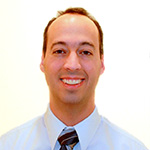October 2015

Peter Moschovis, MD,
MPH
Peter Moschovis, MD, MPH, grew up in Chicago, Illinois, where his mother was a pediatrician at an inner-city public health clinic. In high school, he was involved in humanitarian programs and travelled to the Balkans and Middle East, where he spent time in refugee camps.
Shaped by these experiences and fueled by a desire to help others, Dr. Moschovis earned his MD from the University of Chicago, also completing an MPH in epidemiology at the University of Illinois at Chicago. At Harvard, he trained in a combined pediatric and adult internal medicine residency program and continued his training as a pulmonary/critical care fellow. During residency at Massachusetts General Hospital in Boston, he traveled to Zambia, Tanzania, and Kenya to care for patients. He also went to Haiti shortly after the catastrophic earthquake of 2010—often wearing a headlamp when treating victims and patients, because there was no electricity.
“When most people think of what is needed in low resource settings, they think about things like clean water and immunizations,” says Dr. Moschovis, who serves on the ATS International Committee. “But these experiences opened my eyes to the fact that just a little critical care can make an enormous difference and save lives. Critical care is often not done well—but it can be much better with just a little training.”
Today, Dr. Moschovis spends much of his time doing post-doctoral research in pediatric global health and pulmonary critical care medicine, as well as serving as a pulmonologist and intensivist at Massachusetts General Hospital, where he has been since 2006. He has a joint appointment in pediatrics and pulmonary/critical care medicine at the hospital, where he is a postdoctoral research fellow.
“Despite having a young family at home and being involved in his community, Dr. Moschovis has been able to maintain a clear focus on his patients both locally and globally,” says Leonard Sicilian, MD, clinical director of the Adult Cystic Fibrosis Program at Massachusetts General Hospital. “Recently we spent time together formulating options for airways clearance activities that he could apply to the patients with bronchiectasis and other suppurative lung diseases that he cares for and teaches in Africa. This shows his dedication to practical aspects of care and improving population health in developing countries.”
Every year, Dr. Moschovis spends significant time involved in research programs overseas. He is now working side-by-side with physicians from Mbarara Regional Referral Hospital in Uganda, collaborating to train junior colleagues who will treat children and adults with pneumonia.
“There are no formal pulmonary training programs in Uganda, but there is a huge need—the program that we work for is at a hospital serving a region of eight million people,” he says. “Prof. Julius Kiwanuka, MD, chair of pediatrics at the hospital, and Daniel Muyanja, MD, who runs the hospital’s new pulmonary program, have been instrumental in getting it off the ground.”
Since 2014, Dr. Moschovis has been working with the World Health Organization on a project in India, Bangladesh, Malawi, and Ethiopia that will study whether community health workers can treat people with pneumonia. Currently, the vast majority of people in those countries who contract pneumonia die before reaching a doctor.
“Peter has outstanding resolve, dedication and passion to reduce pneumonia-related mortality globally,” says Patricia L. Hibberd, MD, PhD, chief of the Division of Global Health, Department of Pediatrics at Massachusetts General Hospital. “He is part of the new generation of pulmonologists that are making a difference to this lethal, global disease.”
Dr. Moschovis has also helped in developing the curriculum for the American Thoracic Society Global Scholars program, an initiative spearheaded by ATS President Atul Malhotra, MD. The program trains junior physicians in low resource areas using live and on-demand webinars. Pilot sites include Maputo, Mozambique, as well as Kampala and Mbarara, both in Uganda. At the end of this yearlong curriculum, students will receive a certificate of completion, and those who achieve the highest scores will receive a scholarship to attend the ATS International Conference. So far, the program has received excellent feedback, and more training sites will likely be added, Dr. Moschovis notes.
Dr. Moschovis and his wife, Ariadne, are parents to a four-year-old daughter and two-year-old twin girls. He says he looks forward to bringing his family with him whenever possible during his overseas work. “I can’t think of a better way for them to grow up,” he says.

